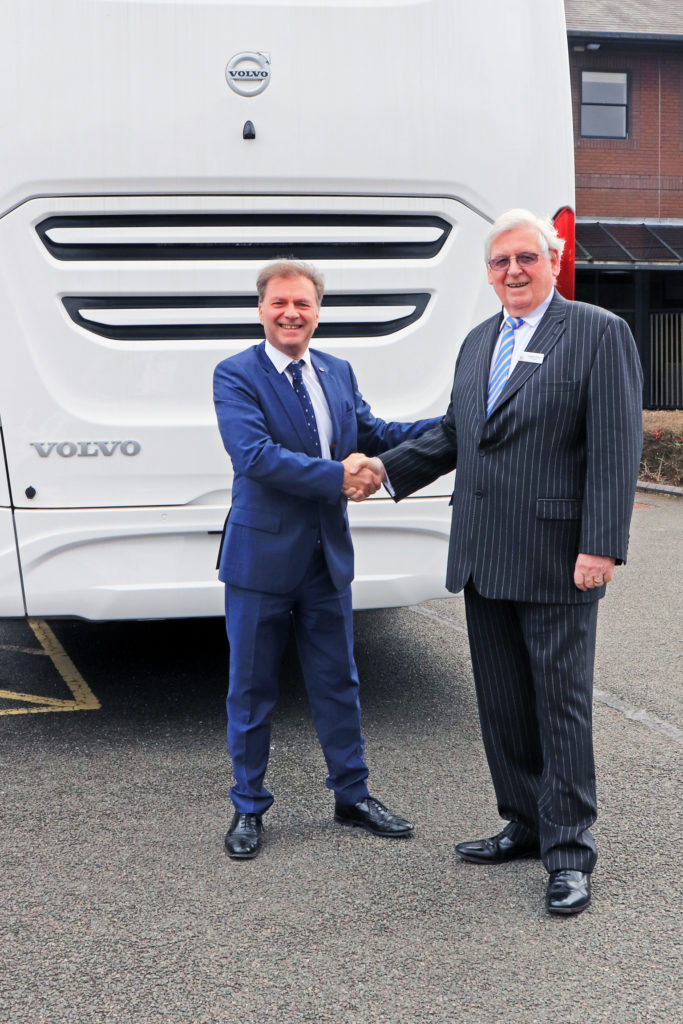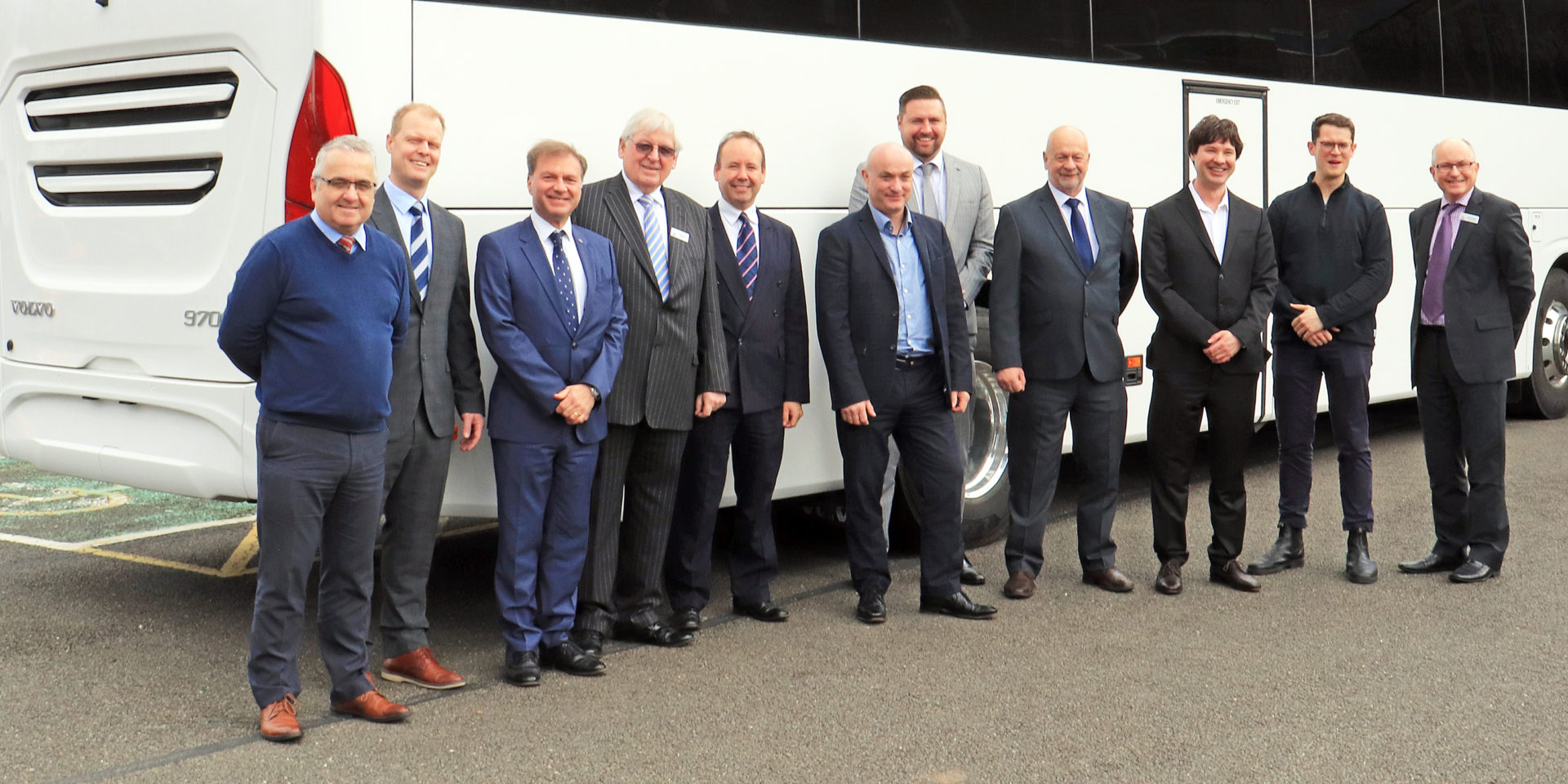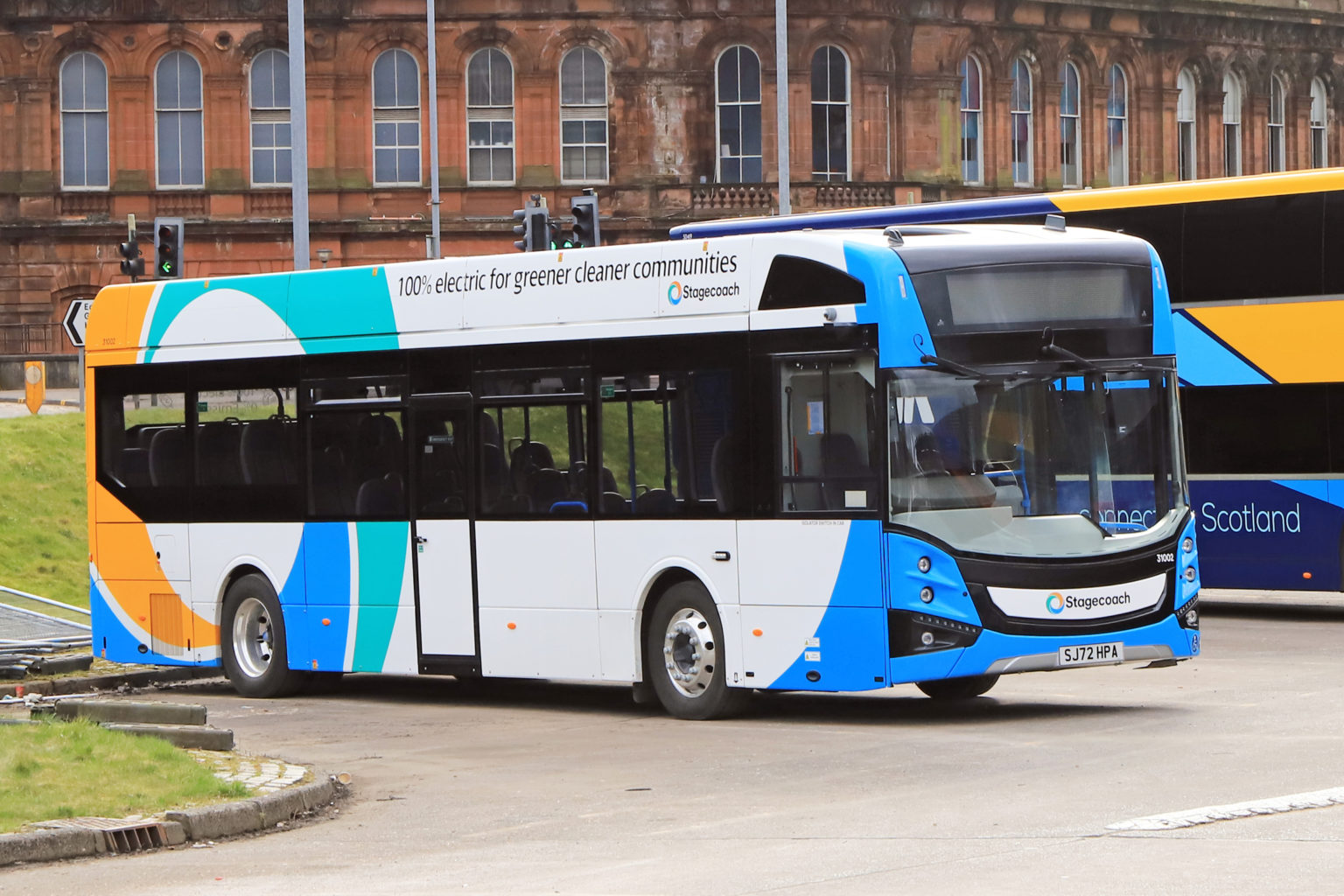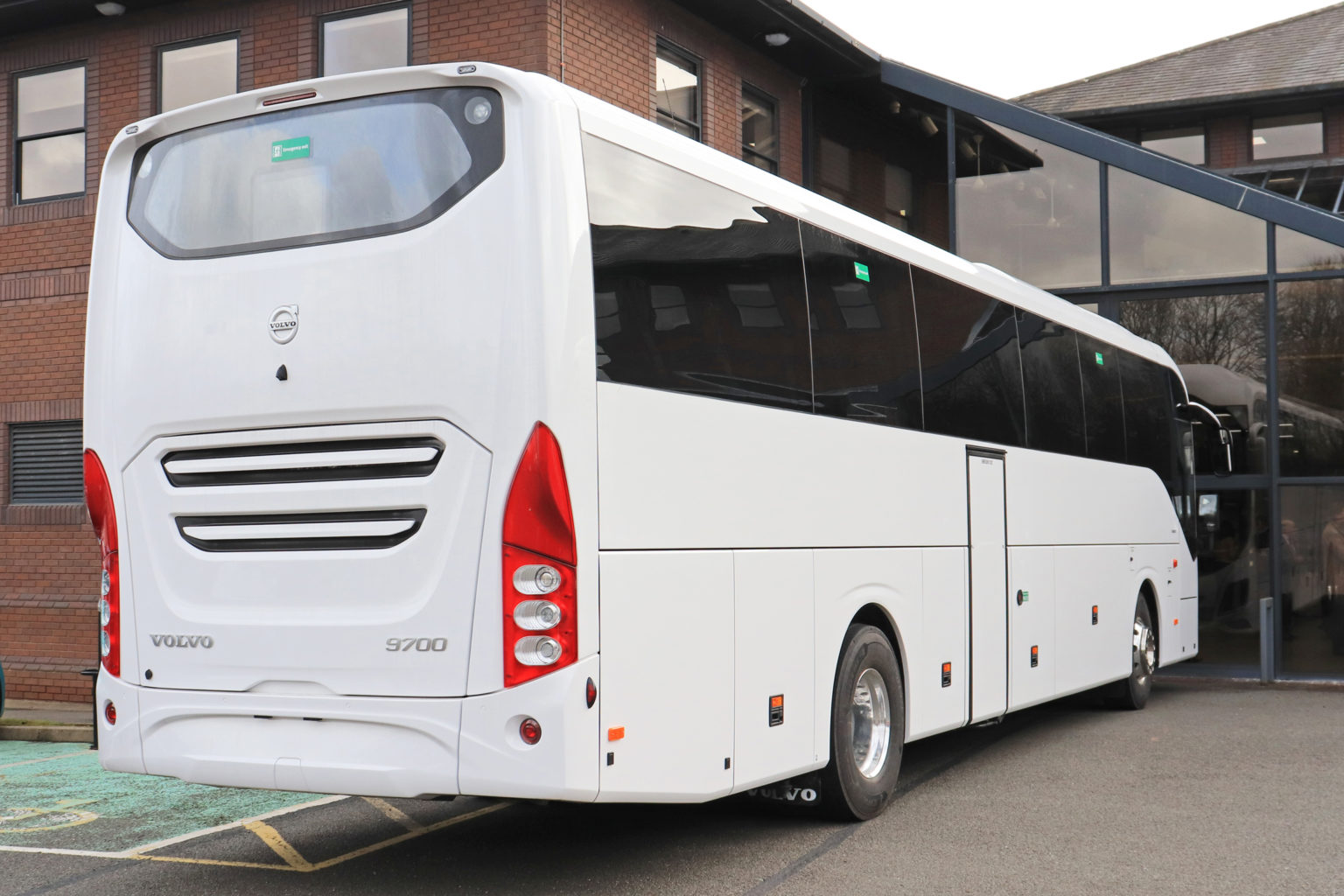The next five years
Challenges for the coaching industry debated at UKCOA’s 2023 conference hosted by Volvo Group UK in Warwick
Moderated by President, Stephen Telling, and attended by operators, manufacturers and suppliers from across the UK, UKCOA’s event covered a wide range of technical and regulatory challenges that the industry is facing now and in the immediate future.
Welcoming UKCOA members and guests, MD Volvo Bus UK & Ireland, Domenico Bondi, expressed his admiration for the many family firms in the coaching business who “play with their own money.” Many will have been associated with Volvo since the legendary B10M which he reminded the audience was launched in the UK 50 years ago. He was keen to see the business from the customer/operator perspective questioning how they were coping with the increase in material prices and whether Volvo should consider increasing the availability of new stock vehicles. Turning to the company’s current range, he confirmed the B13R with the new 13litre engine will be delivered from March and that only one B11R Volvo 9700 remained unsold, this was on display outside the conference arena.

UKCOA President Stephen Telling thanks Volvo Bus UK & Ireland Managing Director Domenico Bondi (left) for hosting the 2023 UKCOA Conference
Acting Traffic Commissioner (TC) for the West Midlands, Miles Dorrington spoke of the efforts being made by bodies such as the TCs and DVSA to work together as a collective body rather than in silos and noted that goods vehicles were the major source of his workload. He briefly mentioned BODS as this applied to some UKCOA members and referred to differences between operators self-regulated reported performance and the DfT’s calculations, one key source of this apparently being the failure to close out routes that were no longer in use. A key development area for the TCs is the process for regulating Connected and Autonomous Mobility (CAM) and alternative fuels from 2025. Describing the opportunities these posed as a “game changing leap forward,” Miles posed the question of whether licensing would be needed in a totally driverless environment where fully autonomous vehicles would remain the manufacturers responsibility. Some form of semi-autonomy is however likely, possibly necessitating a multi-tier regulatory system. Alternative fuels provide another set of challenges in the coaching environment, where will charging points be and how will drivers’ hours requirements fit with them? Transition is also a challenge as not all parts of the UK will move at the same pace and changes should not be unfair to areas where the transition process is slower.
Describing himself as a “big picture person,” Miles was keen to emphasise his supportive role when dealing with operators who were perceived capable of getting it right in the future but noted there are some legislative issues that are causing difficulties: lack of an interim licence process for PCVs meant the 35 day SLA for new applications isn’t achievable and DQCs need review to make the process easier for new and existing drivers to obtain them. He encouraged operators to get involved with the consultation currently taking place on the latter.(see news Bus and Coach Buyer 10 March 2023).

Presenters join the UKCOA team alongside the Volvo 9700 displayed at the conference venue
James Backhouse from Backhouse Jones Solicitors picked up on current challenges from a regulatory perspective, particularly the need for drivers to keep a 12month minimum record of their activities (with 28 days always to hand) where driving under EU regs is involved. Activities need to be either updated on the DQC, written on the back of a print out from the DQC or on the back of an analogue tachograph chart. Challenges arise for new drivers who may not have records from previous non-driving employment and those who only drive very irregularly under EU regs for whom an attestation letter may be appropriate under certain circumstances. He reminded the audience of the obligation to train and monitor regarding this and noted that few CPC courses appeared to cover it. James then moved on to key activities that had the potential for an operator to be called to a PI. Maintenance tops the list with driver walk-round checks a crucial aspect, not just carrying them out but how faults identified are responded to. Drivers’ hours is also high on the list along with Transport Manager reputation. The TC will be looking at the gravity of any issues drawn to his attention and whether there is trust going forward in an operator’s commitment and competency to deliver. He suggested early response to regulatory enquiries is influential on the outcome.
Earned Recognition National Account Manager at DVSA, Phil Breen, sought to promote the benefits of the scheme and allay the fears potential participants might have in sharing data with his team. The concept of Earned Recognition is based on the premise that “the cost of compliance always needs to be less than the cost of non-compliance.” Earned Recognition is a free to join scheme based on a two-yearly audit carried for and at the cost of the operator which is reported to DVSA. The cost of these audits was identified as a potential issue during subsequent questioning and Phil advised that operators should shop around, a list of DVSA ‘audited’ auditors being available on gov.uk. The audit process is also being simplified in respect of multiple operation centres. An interesting discussion was also provoked on whether or not tendering bodies should specify Earned Recognition or equivalent in their processes. The Earned Recognition team has developed specific modules with organisations including TfL and the Guild of British Coach Operators and is in talks regarding a specific UKCOA module.
Driver shortages continue to be endemic in the industry so it was positive to hear from UKCOA’s Andy Palmer about the association’s Driver Academy being underway one year after the concept was launched. The initial scheme is Croydon based, working with the Department of Work and Pensions and training provider NDC and has the potential to deliver over 20 new drivers. A key factor is the ability now for the selected trainees to remain on benefits whilst undertaking full time training, an area that has made similar schemes unattractive or slow to deliver in the past.

The first Volvo BZL electric single-decker for Stagecoach West Scotland in Kilmarnock
The future is zero emission but is the industry ready for the electric coach? From Volvo Bus, Retail Director, Josef Gisslow and Sales Development Manager, Phil Fletcher, looked at the industry’s readiness. Volvo Bus has serious electrification experience in the bus sector with over 3000 hybrid, e-hybrid and battery electric buses in operation worldwide but serious government support will be needed for the nationwide roll-out of suitable infrastructure for coach. Volvo is initially looking at battery electric coaches for commuter and inter-urban operations where the weight and range issues are less arduous, the company also has a JV in place for fuel-cell development. A challenge to manufacturers looking to focus on developing only zero-emission new vehicles is the plan to introduce a Euro7 diesel standard in Europe from July 2027. This will require serious investment to deliver a short shelf-life product given the potential ending of large diesel vehicle sales as early as 2035. Phil posed the question as to whether the Government should be lobbied to retain Euro6 for the UK and should all manufacturers aim for one voice in this matter?
Public transport problems starting with a fallen tree blocking the railway out of Marylebone almost prevented the attendance of Yann Holzapfel and Jack Fantham from the Department for Transport whose focus was the next stages for PSVAR. They briefly reviewed the Medium Term Exemption Programme through to July 2026 before outlining plans for fundamentally reviewing the legislation which will include a three month call for evidence from the spring of 2023 to which a Government response would be expected by the end of 2023. Changes to the legislation, if any, will then take some time to deliver, particularly if negotiations are required on the underpinning UN107 global mandate. The plan is to provide the industry with decent notice of any changes and align the roll-out with the decarbonisation agenda. The call for evidence will likely cover six key areas:
- Scope of the legislation
- Features of vehicles in scope and the ability to flag innovative approaches
- How PSVAR is regulated; currently this is highly prescriptive but should it be outcome based?
- Alignment with net Zero; particularly in reference to investment
- Alternative issues not currently regulated; includes kerb heights, stops and the behaviour of drivers and passengers
Enforcement
The call for evidence details have still to be finalised, for example CAM is currently out of scope but this may change and its timing will be challenging to many, look out for it on gov.uk. Yann also reminded delegates that PSVAR was focused on all disabilities, not just those wheelchair-based, and needed to take into account the impact of an ageing population.
A lively question and answer session raised further items of concern including electric vehicle fire risk and coach bay issues in Westminster. A concern was expressed that insurers are nervous of electric vehicles given the high-profile thermal incidents reported across Europe in recent years. Volvo expressed confidence in the monitoring and control systems for its battery packs and suggested that only the ultimate in RTAs could potentially lead to a thermal incident. In the UK, the DVSA has been investigating more generally a series of thermal incidents involving buses and its report is awaited.
In Westminster, the local authority continues to be troubled by vehicles idling excessively in coach bays and has indicated that these will be removed if the situation continues. Miles reminded the audience of the need to educate drivers regularly on minimising idling but there was nothing that could be done from a TCs perspective about non-UK registered vehicles which had been mentioned as part of the issue.
The busy presentation sessions were closed out by President Steven Telling who made a plea for adequate notice on legislative changes and also stressed the need going forward for all the industry’s trade associations to work together with manufacturers to the benefit of clients.
Volvo Update
Over lunch, a brief opportunity was taken to view the Volvo 9700 coach displayed alongside the venue and talk with Domenico Bondi and Josef Gisslow on Volvo’s product range going forward. In coach, the B13R will be the premium product base going forward, the new 13 litre engine providing superior performance, particular in fuel usage, with minimal impact on overall weight compared to the 11 litre version tested by Bus and Coach Buyer in 2021. Mainstream bus production is now focused on the BZL electric chassis with MCV bodywork. The first single-deck examples have recently been delivered to Stagecoach West Scotland and the first deliveries of double-deck examples are imminent. Although the diesel and hybrid B5 models are no longer offered, eight litre vehicles remain an integral part of the Volvo range with the B8RLE carrying MCV eVoRa bodywork featuring strongly in retail sales.
